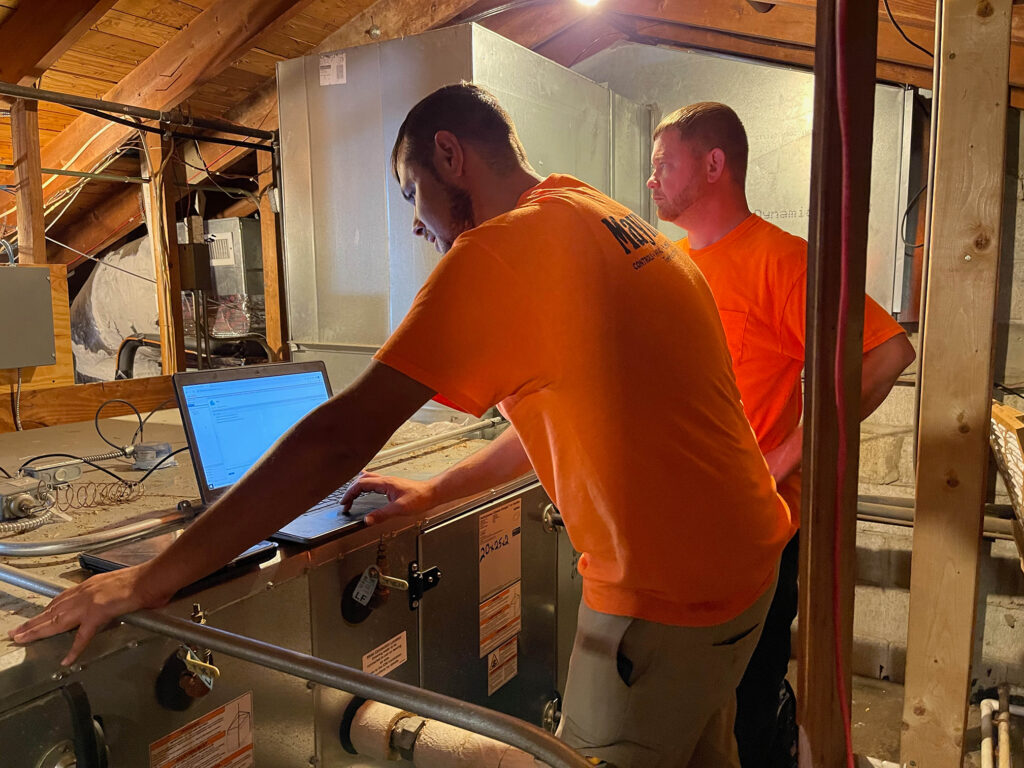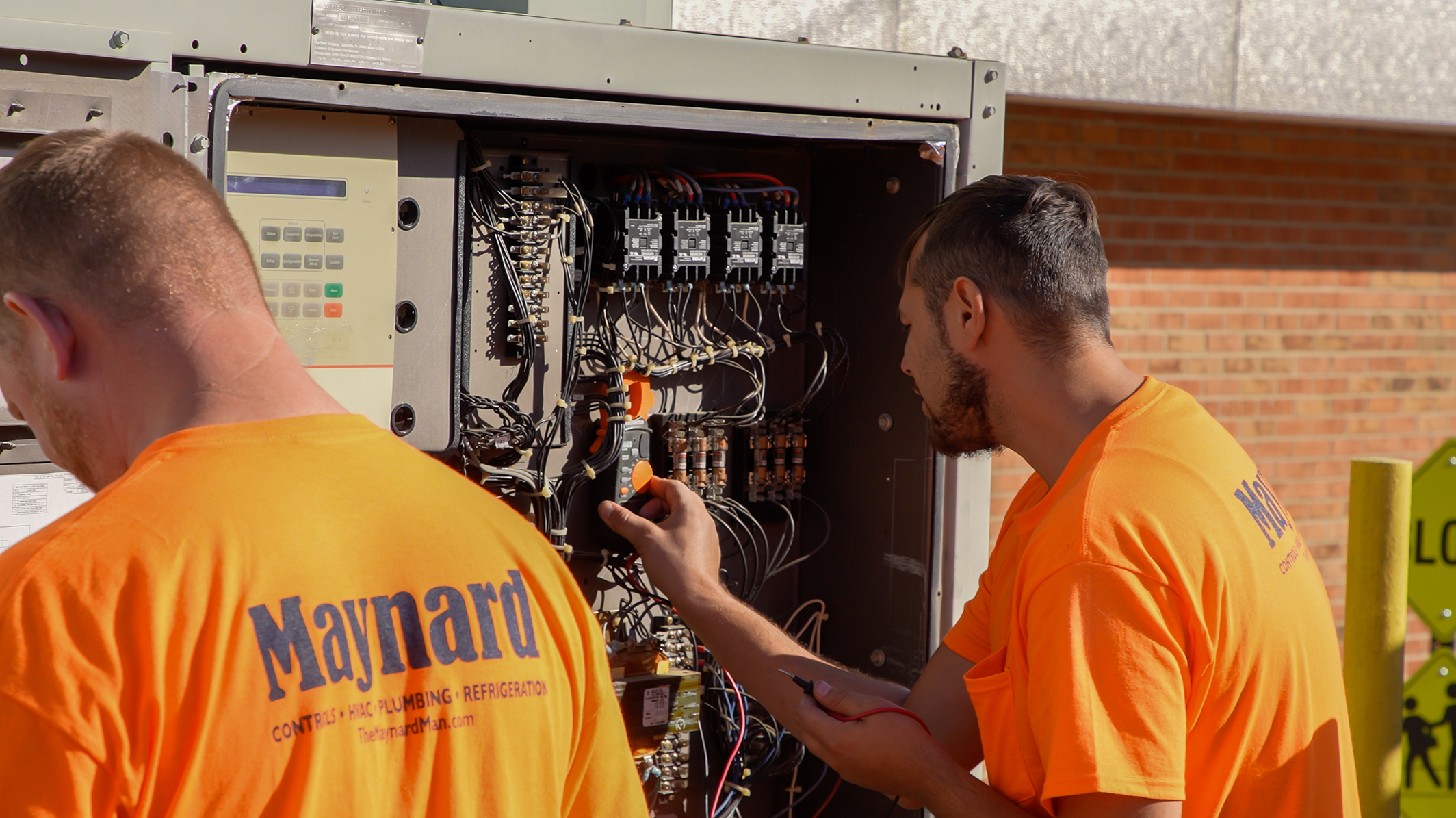As a 17 YEAR partner with Delta Controls, one of the largest manufacturers of building automation systems, Maynard Select brings some of the most energy efficient and sustainable solutions to Nashville and Middle Tennessee. As industry leaders, our track record includes delivering dependable and user-friendly building control solutions to commercial, healthcare, education, leisure buildings and more.

Keeping energy costs and carbon footprint size down, while maintaining a healthy, productive environment, makes your facility more valuable. Maynard Select offers complete end-to-end energy management solutions. From meters, to public displays, to sophisticated dashboard based management software, Maynard Select has the right products to reduce consumption and save money.
From new construction with Delta Controls UL certified relay panels, to bringing an existing building’s relay panels up to today’s technology with Maynard Select is simple. Easily updating a panel to a Delta Control system will allow better control strategies such as occupancy, photocell, astronomical clock, and common area control. This allows the use of the same occupancy scheduling as the HVAC applications.
As buildings become smarter, networks can become increasingly difficult to manage. With a single integrated network, Maynard Select can provide access control solutions that are reliable, responsive, and easier to manage. With management software, IP cameras, doors, and other field devices integrated into one network, Maynard Select access control solutions make building operators’ lives easier.
Integration is the art of combining two or more systems seamlessly and true integration is the seamless sharing of data, without the duplication. Integration can be achieved in a number of ways. Using various systems, Maynard Select builds an understanding of your integration needs and provides many possibilities, such as HVAC, access control, energy meters, lighting, chiller package data, speed drives, asset tagging, databases, etc.
The O3 Creates a New Touchless World, With Less Risk of Contagion
Experience the Best Room Control on the Market
With advanced temperature sensing, the O3 provides a more comfortable environment for you and your staff. The O3 reacts to changes in temperature and people entering and leaving a space faster than any other sensor on the market.
Sleek, smart, and efficient, the O3 is designed to complement a room, not distract from it. Installed on the ceiling, the O3 provides the best vantage point for better control and better detection, without cluttering your walls.
With seven different sensors onboard, the O3 utilizes Sensor Fusion to enhance occupancy detection and temperature reading. The O3 reacts fast when you leave the room—turning off lights, reducing heating and ventilation, saving you money.
The enteliBUS Manager (eBMGR) is a fully programmable native BACnet Building Controller. It supports multiple communications methods including, as standard, BACnet/IP, BACnet over Ethernet, BACnet MS/TP, and Delta LINKnet..
The Manager is the automation engine of the enteliBUS Control System. It contains the primary CPU, memory storage, and external communication ports. The Manager also provides the control logic for enteliBUS I/O expansion backplanes.
An optional integrated LCD touchscreen provides local interface capabilities.
The enteliBUS Control System is made up of multiple modular components that are selected to meet the exact needs of a wide range of HVAC and Access control applications.
The eBMGR has multiple applications. By itself, it is a powerful system manager/BACnet router. With expansion backplane(s) attached, the eBMGR functions as an expandable I/O controller.
Use the enteliBUS Control System in low to medium density I/O applications to control a single piece of equipment, such as an AHU or chiller. Use it in high density I/O applications to control an entire mechanical room or central plant.

Even with today’s efficiencies, lighting can still be a significant operating expense for commercial and industrial buildings. However, it’s also a critical factor for ambiance, establishing visual comfort, and maintaining the productivity of the occupants. In addition, implementing lighting controls through various strategies allows facility managers to tailor the lighting to meet the needs of specific spaces. Learn more about how today’s energy-efficient LED lighting can enhance your building’s performance and generate considerable benefits for your business when paired with networked lighting controls.
Lighting controls are devices and complete systems that create operational flexibility into lighting to support energy management and occupant needs. These devices and systems accept an input, decide how to reduce the lighting, and control the load as an output. These inputs may be manual from human intervention or automatically based on time, occupancy, available light levels, or an energy management system. The results are typically switching, dimming, or control data. The unique combinations of inputs and outputs give us various lighting control strategies to deliver significant energy cost savings.
A Building Management System allows LED lighting to be integrated and controlled along with heating, ventilation, and HVAC systems through specific protocols.
These simple sensors ensure that lights only operate when occupants are in a room. In addition to basic occupancy sensing, ultrasonic sensors detect sound, and infrared sensors detect heat and motion. Easily added to individual luminaires or the room itself, occupancy sensors are ideal for areas not constantly used, like conference rooms, storage areas, or restrooms. It’s also applied to parking lot applications, wall packs, and stairwell luminaires.
Daylight harvesting controls automatically adjust lights based on the available daylight coming into the room. As the sun rises and sets, the electric lights change to maintain predetermined light levels for the space. Daylight harvesting is best suited for areas adjacent to windows, under skylights, or wherever outside light is consistent.
This strategy provides pre-programmed changes to a light’s levels based on the date and the time of day. A time clock schedule is suited to larger spaces that are regularly occupied and spaces that are occasionally occupied but must have lights remain on for safety and security purposes.
This lighting control strategy sets the maximum light level based on mandated requirements for a particular room or zone. In addition, task tuning analyzes the light needs in each space and dims various areas based on condition.
Personal control gives occupants the ability to adjust the light output to their comfort level. Often found with dimming switches local to the room where the occupant is.
Networked lighting controls (NLCs) bring together multiple LED luminaires and blend the different lighting control strategies based on the space requirements. By combining the LED lights, controls, connectivity, and data, these flexible systems can improve occupant comfort and space utilization. Networked lighting controls often include occupancy sensing, daylight harvesting, continuous dimming, and more
This platform helps identify energy usage in a building and helps drive conservation efforts for even more cost savings.
A demand response program automatically reduces lighting loads during peak electricity usage times or periods of high pricing. This program requires the ability to measure load at any point, accept a utility signal to start, stop, and measure a load shed event